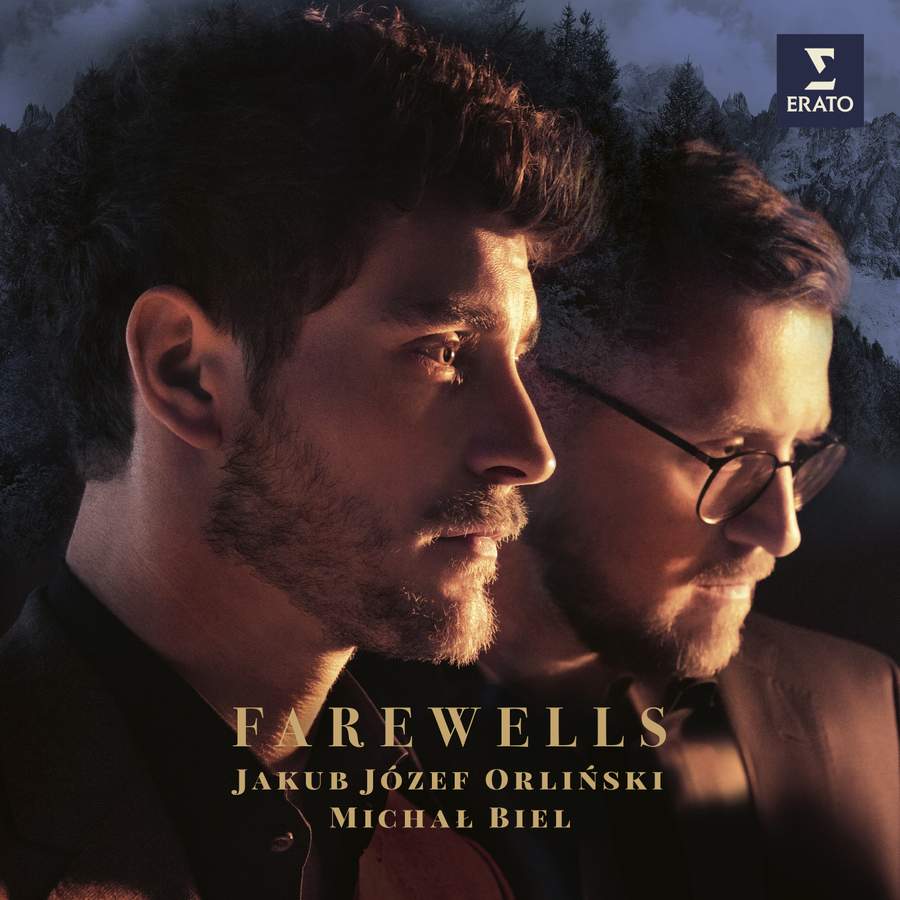Jakub Józef Orliński: Farewells
View record and artist detailsRecord and Artist Details
Genre:
Vocal
Label: Warner Classics
Magazine Review Date: 07/2022
Media Format: CD or Download
Media Runtime: 57
Mastering:
DDD
Catalogue Number: 9029 62697-0

Tracks:
| Composition | Artist Credit |
|---|---|
| Four Love Sonnets |
Tadeusz Baird, Composer
Jakub Józef Orliński, Countertenor Michał Biel, Piano |
| Farewells |
Henryk Czyz, Composer
Jakub Józef Orliński, Countertenor Michał Biel, Piano |
| (10) Songs, Movement: Speak to me still (Tetmajer) |
Mieczyslaw Karlowicz, Composer
Jakub Józef Orliński, Countertenor Michał Biel, Piano |
| (10) Songs, Movement: From the erotics (Wasniewski) |
Mieczyslaw Karlowicz, Composer
Jakub Józef Orliński, Countertenor Michał Biel, Piano |
| (10) Songs, Movement: On the calm, dark sea (Tetmajer) |
Mieczyslaw Karlowicz, Composer
Jakub Józef Orliński, Countertenor Michał Biel, Piano |
| (10) Songs, Movement: Before eternal night (Krasinski) |
Mieczyslaw Karlowicz, Composer
Jakub Józef Orliński, Countertenor Michał Biel, Piano |
| (10) Songs, Movement: Weep not over me (Iwanski) |
Mieczyslaw Karlowicz, Composer
Jakub Józef Orliński, Countertenor Michał Biel, Piano |
| (10) Songs, Movement: In the calm of the evening (Tetmajer) |
Mieczyslaw Karlowicz, Composer
Jakub Józef Orliński, Countertenor Michał Biel, Piano |
| (10) Songs, Movement: The enchanted princess (Asnyk) |
Mieczyslaw Karlowicz, Composer
Jakub Józef Orliński, Countertenor Michał Biel, Piano |
| (10) Songs, Movement: Over the wide, wide sea (Tetmajer) |
Mieczyslaw Karlowicz, Composer
Jakub Józef Orliński, Countertenor Michał Biel, Piano |
| Sometimes, when long I dream... |
Mieczyslaw Karlowicz, Composer
Jakub Józef Orliński, Countertenor Michał Biel, Piano |
| (6) Songs, Movement: My soul is sad (Tetmajer) |
Mieczyslaw Karlowicz, Composer
Jakub Józef Orliński, Countertenor Michał Biel, Piano |
| (6) Songs, Movement: Whence the first stars (Slowacki) |
Mieczyslaw Karlowicz, Composer
Jakub Józef Orliński, Countertenor Michał Biel, Piano |
| Jesień (Autumn) |
Pawel Lukaszewski, Composer
Jakub Józef Orliński, Countertenor Michał Biel, Piano |
| Tear |
Stanislaw Moniuszko, Composer
Jakub Józef Orliński, Countertenor Michał Biel, Piano |
| Prząśniczka (The Girls) |
Stanislaw Moniuszko, Composer
Jakub Józef Orliński, Countertenor Michał Biel, Piano |
| (6) Kurpian Songs, Movement: Book 1 |
Karol Szymanowski, Composer
Jakub Józef Orliński, Countertenor Michał Biel, Piano |
Author: David Patrick Stearns
Many surprises here, starting with Jakub Józef Orliński appearing on the album cover looking thoroughly adult and fully clothed (no bare shoulders on this one). In his programme of Polish art songs, Szymanowski is the most familiar composer, though poets Pushkin, Shakespeare and Heine are represented in Polish translation. The total package has qualities of a parallel universe: the piano-writing recalls Romantics from Schubert to Liszt though with gestures and vocal lines that don’t follow the usual contours. Even the folk text-settings by Szymanowski are full of emotional and thus musical complications not heard even in Mahler’s Wunderhorn period. Amid all of this, Orliński's low-vibrato straight tone lends an emotional directness to the music’s brand of introspection.
Such directness is warranted in the anguished outcries of the three Pushkin settings by Henryk Czyż (1923-2003) that set the tone for the recital’s title, ‘Farewells’. The music feels like something out of Pushkin’s own time and the 19th-century Romantics that immediately followed him, with rich harmonies, short repetitive motifs and meaningful pauses that show the poet addressing the beloved in no uncertain terms. The final song breaks off inconclusively, as if the weight of the emotion can’t be expressed in words or sound. The Shakespeare sonnets set by Tadeusz Baird (1928 81) inspire such a range of responses that the songs seem more like miniature scenas, each its own world: Sonnet 56 (‘Sweet love, renew thy force’) with an effective network of recurring motifs, Sonnet 97 (‘How like a winter hath my absence been’) with chillingly spare accompaniment and Sonnet 91 (‘Some glory in their birth’) with strophic symmetry appropriate to the text’s recurring patterns.
The major discovery here is ‘Jesień’ (‘Autumn’) by Paweł Łukaszewski (b1968). The piano-writing has haunting recurring bass notes, cimbalom-like treble plus vocal lines both sung and hummed in what amounts to a miniature tone poem. Here and throughout the disc Orliński is attuned to the text- and word-painting in the music, avian imagery especially, all showcased with special acoustic warmth. Limitations, though, become apparent in songs by Mieczysław Karłowicz that tend to go for the bare-bones essence of the poem – no window-dressing or scene-setting. Here one realises that Orliński's voice is wired to create a clean melodic line rather than more word-based conversational phrasing. The sameness in the songs reveals the sameness in Orliński's attacks and overall vocal colour. Studio itis is also evident in pianist Micha Biel’s meticulousness over poetic tension.
The recital more happily concludes with the Schubert/Schumann throwback in selections by Stanisław Moniuszko, especially ‘Prząśniczka’ (‘The Girls’), which describes a women’s spinning factory with piano-writing reminiscent of Schubert’s ‘Gretchen am Spinnrade’. The relatively short 57-minute length is actually just right.
Discover the world's largest classical music catalogue with Presto Music.

Gramophone Digital Club
- Digital Edition
- Digital Archive
- Reviews Database
- Full website access
From £8.75 / month
Subscribe
Gramophone Full Club
- Print Edition
- Digital Edition
- Digital Archive
- Reviews Database
- Full website access
From £11.00 / month
Subscribe
If you are a library, university or other organisation that would be interested in an institutional subscription to Gramophone please click here for further information.




